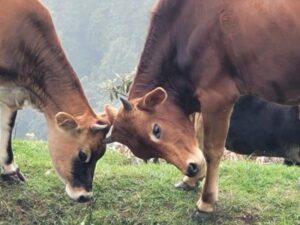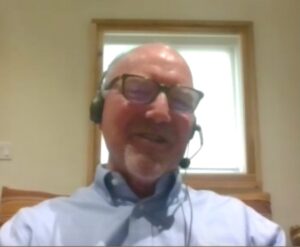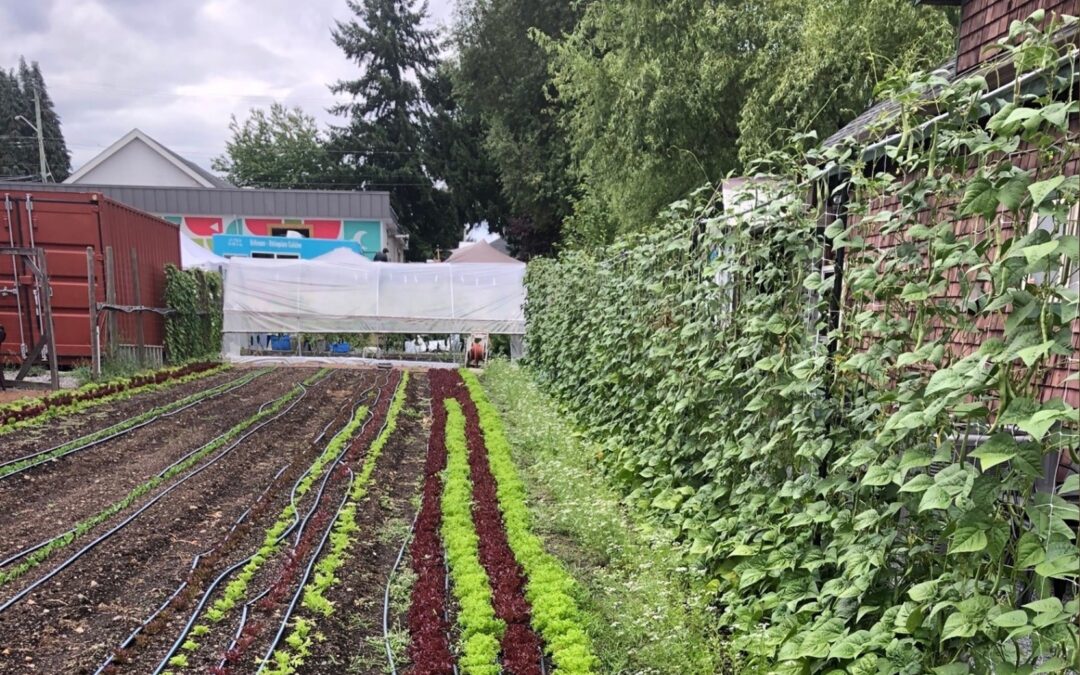Listen to Mary Kean reading this article (20:46)
Burning fossil fuels brought the long hot summer and drought to the rainforest of British Columbia in 2023. Water restrictions were declared as farmers lost crops and the earth was parched.
Someone we might consult about the farming situation is the person for all things sustainable agriculture and land use, Dr. Kent Mullinix, Director of the Institute for Sustainable Food Systems (ISFS) located at Kwantlen Polytechnic University.
Dr. Mullinix has practiced, taught, studied, written about, and advised other farmers and government about all aspects of agriculture for forty-six years. An incredibly knowledgeable person, his life’s purpose and meaning is farming: growing food, raising animals, reading the soil, the weather, the watershed.
And yet, he is the kind of person who will engage in a conversation such as this one for the cause of sustainability and a better understanding of what it looks like literally in the trenches. Within minutes one understands in talking with Kent Mullinix that there is definitely a right way and a wrong way to go about growing food for human consumption and for creating healthy plants and animals more able to withstand assaults like drought as a result of the climate crisis. Our conversation has been edited for brevity.
Dr. Kent Mullinix: If people really knew how beef,
pork, and poultry is produced in conventional systems,
they would not eat that animal protein. They would be
aghast, literally aghast. That’s an environmental and
ethical travesty. Our grandfathers would have
been run out of town on a rail if they had treated hogs
the way they’re being treated now.
But there are ethical parameters and standards around
organic livestock production to which the producers
have to adhere. What’s even more important is that most
organic livestock producers are also engaged in crop
production so they are integrating animal production
with crop production. Animal manures contribute to
the fertility of the soil and the control of weeds.
This is a forward-thinking throwback to the time
when agriculture was less environmentally destructive
(and) configured and operated in ways that mimick-
ed natural processes. (For example) animal grazing,
and the rotations of the herds covered fields with
manure deposition contributing to (the health and
fertility of the soil). The humane production of
animals within crop production systems can
contribute to a more ecologically sound system.

Photo: Colin J. Sanders
Of course, there are industrial organic producers.
Big outfits. There’s organic and there’s organic out
there. There is organic that meets all the codified
stipulations but I have met organic farmers who
really could care less about organic farming. It’s
all about money to them. Just capturing that
premium that the organic market presents.
Organic Farming and the Climate Crisis
To summarize a portion of our conversation: I gathered that while agriculture contributes to Green House Gas emissions as trees, bushes and brush are cleared away and sod is broken open in plowing, the real question is does agriculture put back into the environment what it takes out? Organic farming appears closer to that objective than conventional farming. For example, I learned that pesticides used in organic farming are biologically or naturally derived such as certain tree oils or other plant-based substances. These are generally harmless to humans and off target species and not persistent in the environment.
For organic food to be altogether healthy for humans, it has to come from healthy soil that has not been chemically contaminated so that the soil is a comfortable environment for beneficial microbes to thrive. This is no easy task as anyone who gardens knows. Our personal veggie garden took four years to leach out all the chemicals put on it to kill moss. Of course, the moss thrived.
Farmers and Financial Stability
Back to the conversation and comments from Dr. Mullinix:
GTEC: The Community Supported Agriculture
program (CSA) where people pay farmers and get
food directly from them seems very healthy and
intrinsically connects people to where their food
is coming from.
KM: Absolutely.
GTEC: I had a CSA agreement with a young
farmer who was not able to make it. He left
farming and did something else.
KM: Farming is inherently difficult. You get to
plant your farm (once a year, about forty times
in the working career of a farmer) and see if
what you’re thinking works. And you’re doing
this in a complex system with unpredictable
variables. You don’t know if it’s going to rain
tomorrow. You don’t know if it’s going to rain
a week from now. You don’t know if the life
cycle of the flea beetle is going to be encouraged
by the current weather pattern or not.
This is a lot why we have gravitated toward an
industrial mindset because then you create the
farm as a factory where all of these things are
controlled. Where you sterilize the soil. Your crop
production is not based on the health or biology
of the soil. It’s based on it being a repository for
irrigation water and synthetic fertilizers that you
stick plants in.
That’s what industrial agriculture is about: taking
away this complexity and the inherent risk of it.
But when you embrace ecologically based
agriculture like organic production systems do,
you embrace all that complexity and all that
uncertainty.
It requires much more sophisticated thinking,
much more knowledge, much more awareness,
much more connection (to the earth), which is
why organic farming thrives on smaller farms.
You can’t do it effectively on expansive farms.
Organic agriculture actually reflects significantly
the agrarian ethos of former times. Knowing
your land, being one with your land, working
with your land and in your climate and weather
and being a student of that all the time. It’s a
completely different way of farming. A completely
different way of thinking about it. All of agriculture
is absolutely a way of life that represents a different
commitment to Mother Earth and to your fellow
human beings.
GTEC: I couldn’t agree with you more.
I wonder if you have an idea of a solution
to this feudalistic thing where my young
farmer couldn’t afford the overhead of
having to pay the land owner to rent his fields?
KM: It’s all a matter of policy that reflects
our economic thinking. Like everything, it’s
super complex but I’ll start with just farmers
in general.
Farming is generally marginally profitable
or not profitable at all and hasn’t been for a
long, long time. According to the National
Farmers Union data analysis in Canada, farmers
really haven’t made any money for 70 years.
Net profit has been absolutely flat in adjusted
terms. But the cost of farming has gone up, up,
up almost exponentially All the while, net receipts
have been flat. What this means is that the farmers
are all working their tails off, experiencing great
despair while they make money for the input and
post-production companies like John Deere,
McCain’s, Nestle, Monsanto, and for the retailers.
That’s where all the money in agriculture is going,
leaving farmers with nearly nothing. Everybody
seems okay with that to the extent that now farming
is considered an undesirable occupation in the
greater society. Nobody with a lick of sense would
engage in a professional activity with risk of such
magnitude to potential return for effort. Who would
do that? Honestly, only somebody in love. Only
somebody who understands the intrinsic importance
and value of working with the land, with creation
and producing wholesome food.
But the deck is stacked so a farmer gets very little
income for all of their labor. They can’t pay their
mortgage or costs of production. They can’t even
pay their taxes on that. So what do they do?
GTEC: Sell their farm to the developers.
KM: They do. The retirement (plan) for all
farmers is not in the business they created.
It’s in the land that they created their business
on because their business is not worth all that
much. But their land is worth a lot. Its value is
not in agriculture. Its value is in competing
economic interests.
We’ve created an agriculture system that actually
encourages all farmers to support the inflated non-
agricultural value of their land. Because that’s the
only way they’re going to have any resource to
retire on. They sure weren’t able to save
any money from farming. They likely couldn’t
even send their kids to university from farm business
profits.
In the 30s and 40s especially, we wanted to
promote industrialism, so we wanted people off
the farm and into factories in the city. We did
everything we could to discourage people to
farm and get them into (factories and industrial
life). Back then, farming only made strong
communities and family farms, but it didn’t
make people rich. It just let them make a good
living and be happy. But that wasn’t good enough.
People were needed off the farms and into
the cities to make cars and washing machines
for the industrialists and the consumer as opposed
to the agrarian economy.
Industrialized Farms, the Enclosure Movement, and Land Use
GTEC: Then the only other answer was to
industrialize farming itself?

Dr. Kent Mullinix, Director, Institute for Sustainable Food Systems, KPU
KM: Yes, exactly. Farming was the last element
of our economy to be industrialized. And now
we’re coming to understand how destructive
that was in terms of family farming, in terms
of rural community vitality and in terms of
environmental health and everyone’s health.
Successful farming is a colossal policy failure.
Even in. BC, where we’re so proud of the
Agricultural Land Commission and Land Reserve,
it’s kind of disingenuous because even the
land in the ALR is valued beyond anything
that agriculture can service. You couldn’t buy
an acre or ten acres of agriculture land, ALR
land, in the lower mainland and service the
debt from agriculture. It’s too expensive. A
million bucks an acre. These small organic
farmers, doing CSA’s and farmers markets
and those kinds of things, there’s no way they’re
going to service $100,000 an acre. $250,000
an acre. Can’t do it. You’re protecting this
land for development (not agriculture).
It all comes down to the sacrosanct concept
in Western thinking that private property
rights reign supreme. It derails every possibility.
As long as agriculture land is not seen as a
natural resource that should be held and
utilized for the common good, we’re sunk.
GTEC: Of course, that’s a European practice
that settlers brought to this continent.
European farmers and herders, before the
Renaissance times, shared grazing and crop
growing fields in lands they called Commons.
Then, the king enclosed common land with
stone walls so that he could have the game
and lumber from the forest, gather taxes and
impose fines if the land were used by anyone
else, right?
KM: Yes, the Enclosure Movement. The
one per cent could gather all the wealth. I just
read a great book about that called Less Is More.
The author is Jason Hickel, a young (economic
anthropologist) from Britain. He speaks about
the enclosure movement and how it was (an
early) manifestation of the capitalism that
dominates today. Colonialism was just the
next step in enclosure. You just enclose whole
continents.
GTEC: Oh, I never thought of it that way.

KM: They took everything away from them.
It devastated the economy of the common
people.
So, now, what can be done?
Well, policy (changes) but (first) there needs
to be an economic and food system objective
question. What do we want in a food system?
Do we want young people on the land farming
organically and building these local regional
food systems? My answer to that would be
yes, absolutely. That’s going to be the only
way we’re going to bring about a deeply sus-
tainable food system.
To make that happen, you’re going to have
laws that say only trained agriculturists can
own agriculture land. There are countries that
do that: if you’re not technically capable of
farming, if you don’t have a viable agriculture
farm plan, you can’t own farmland.
My research group studies this; how to do
this. Our Institute for Sustainable Food
Systems, one of the dominant research and
extension groups in Canada, is looking at
this. In an in-depth report the countries
that have done that are discussed.
Other countries have mechanisms to set
the price of farmland based on the agricul-
tural merit of the land. These countries
absolutely do not allow foreign owner-
ship of agriculture land. They don’t want
to sell away their capacity. Other countries
set up systems where a governmental body
has the first right to buy the farmland when
it comes up for sale. They regulate the market.
In North America, everybody gets up in arms
about regulating markets. But actually we
regulate markets all the time; we just don’t
do so for the common good.
For some reason, and very disappointingly so,
the current government has set its sights to make
BC a global agri-tech leader. It’s just the
opposite of what they ought to be doing. They
ought to be promoting robust local, regional
food systems and organic agriculture. They
say they’re focused on regenerative agriculture
but nobody really knows what that is. Everybody’s
interpretation of that is left to their own
devices. I guess regenerative agriculture is
conventional agriculture not being so
destructive and that it contributes to climate
change adaptation and mitigation. But the
real thinking, whether the proponents will
acknowledge it forthrightly or not, is that
technology is going to solve all our problems.
They are just unwilling to acknowledge that
an organic agriculture system or method exists
that can produce all of the healthy, nutritious
food we need and want in ways that don’t destroy
the earth. Instead, they want to keep doing more
of the same and expect a different outcome.
It’s not going to happen.
(When) I’ve spoken with the provincial government
about this, I could just see their eyes
glaze over because their mindset is about
innovation in technology and bringing investment
money into the agritech sector. GDP
focused thinking. Not community focused action.
We can’t get away from the Chicago School
of Business thinking.
Organic agriculture amongst mainstream
agriculturists is held in great disdain. There’s
no sense that organic agriculture has anything
to teach or to offer to mainstream agriculture.
I’ve seen and heard it my whole career and
nothing’s changed. Even as we learn of the
negative outcomes of the industrial-agro food
system, we still can’t bring ourselves to say,
“Well, maybe the organic people who developed
farming systems to nurture Mother Earth, to
nurture soil health, to promote biodiversity
on the farm. to build community, to produce
the most wholesome, nutritious foods possible
– maybe they have some good thinking going
on there.”
I’ve been on farm tours, Mary, where we’ll stop
and look at the neighbour’s organic farm. The
host will make some joke about the organic
farmer being a hippie and couldn’t farm their
way out of a wet paper bag and everybody just
laughs because the (organic farmer has) weeds;
because they don’t use herbicides.
Our Institute for Sustainable Food Systems
just got commissioned to do a meta-analysis
and kind of present the argument for why
BC government should embrace organic
agriculture and advance it.
The fact of the matter is we’re not going to
be able to change the system until we
fundamentally change our thinking. Until we
do that, we don’t stand a snowball’s chance
in hell. People have got to want this a lot more
than they want another vacation to Thailand
or Hawaii, much more than a than a new boat
or a new car. They don’t want the right things,
and so their governments don’t support doing
the right things.
One of my mentors is a fellow named John Ikerd
who is an agricultural economist and I’ve heard
him say this more than once: “Hope doesn’t lie in
your confidence that you’re going to prevail.
Hope lies in the knowledge that what you’re doing
is the right thing to do.” I think that that’s where
our hope lies. I don’t want to impose my thinking
on anybody, but I don’t know how anybody
can think that destroying the very means
for the existence of all creation is the right
way to live.
 Mary Kean is a widely published poet and writer. She edited The Journal of Collaborative Therapies and was a Couple and Family Therapist for over 20 years. The Climate Crisis has been a concern of hers since she read Rachel Carson’s Silent Spring. Her work as editor of the GTEC Reader is on behalf of her grandchildren.
Mary Kean is a widely published poet and writer. She edited The Journal of Collaborative Therapies and was a Couple and Family Therapist for over 20 years. The Climate Crisis has been a concern of hers since she read Rachel Carson’s Silent Spring. Her work as editor of the GTEC Reader is on behalf of her grandchildren.


